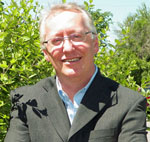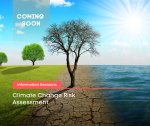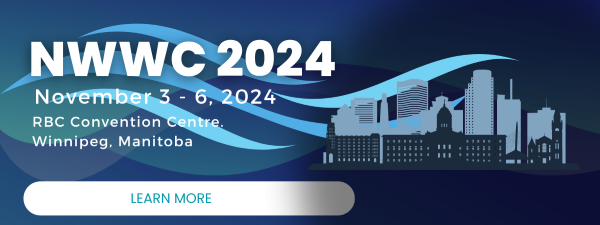 |
||||||||||||||||||||||
| Subscribe | Past Issues | www.cwwa.ca | Water Source Magazine | ||||||||||||||||||||||
|
CWWA News
The IWA’s World Water Congress & Exhibition 2024 is now officially in the history books. CWWA, and our partners at the Canadian Association on Water Quality (CAWQ), were so proud to host this premier global event right here in Canada.
ACE24 in California (the AWWA Annual Conference and Expo) featured a lot of conversations about building Resilient Water Systems. Water and wastewater climate change practitioners in Canada know that building resilience starts with understanding, identifying and quantifying, risks and vulnerabilities in order to prioritize their actions. The CWWA Climate Change committee is working on an Information Series that is dedicated to exploring Climate Change Risk Assessments. The Information Series will provide information about risk assessment methodologies, tools, and resources available. You are not alone in this journey!
Federal Initiatives
Water Canada The federal government has allocated over $24 million to New Brunswick as part of the Canada Community-Building Fund (CCBF) for the first installment of the 2024-2025 fiscal year. This investment will support critical infrastructure projects across the province, including upgrades to water, wastewater, and stormwater systems. Federal, provincial, and territorial ministers responsible for conservation, wildlife, and biodiversity in Canada convened in Gatineau, Quebec, to reaffirm their dedication to implementing the Global Biodiversity Framework. They emphasized the need for a coordinated, whole-of-society approach to meet the 2030 goal of protecting 30% of land and water and reversing biodiversity loss by 2050. The ministers highlighted ongoing jurisdictional contributions and the importance of innovative strategies for area-based conservation. They also discussed enhancing species protection through a multi-species and ecosystem approach and recognized Indigenous leadership and knowledge as vital to conservation efforts. Better stewardship of natural spaces leads to a healthier watershed and better resiliency to climate change, so any initiative to protect biodiversity should have trickle down positive impacts of the water and wastewater sector. Occasionally having a protected species in a watershed can make permitting and infrastructure build and upgrades more complicated, so members should be aware of these initiatives in their area. The Government of Canada is advancing its environmental protection efforts by focusing on perand polyfluoroalkyl substances (PFAS), known as “forever chemicals,” which persist in the environment and may harm human health. An updated Draft State of PFAS Report and a revised Risk Management Scope have been published, proposing a phased regulation approach, starting with firefighting foams and extending to other uses. The government is also considering a separate assessment for fluoropolymers and the potential addition of these to a Watch List under CEPA. Stakeholders are invited to comment until September 11, 2024. Canada continues to monitor PFAS in humans and the environment, with plans to publish a final Prohibition of Certain Toxic Substances in fall 2024 and a final objective for PFAS in drinking water soon. Actions are also being taken to mitigate risks at contaminated federal sites.
Provincial News
New regulations have been introduced for resolving disputes between the Province and First Nations concerning environmental assessments, aiming to foster reconciliation and environmental protection. The Environmental Assessment Office’s (EAO) regulation provides structured, alternative pathways to litigation for First Nations to challenge decisions on large projects requiring environmental assessment certificates. The process, grounded in the UN Declaration on the Rights of Indigenous Peoples and the Environmental Assessment Act, involves a third-party facilitator to aid in consensus and relationship building. Developed in consultation with First Nations, industry, and dispute-resolution experts, the regulation reflects Indigenous traditions and legal systems, striving for a collaborative and principled approach that respects First Nation rights and adheres to the UN Declaration. Snippings & Clippings
Water Canada Canada is taking action to help protect and manage freshwater ecosystems, including the Lake Winnipeg basin. Lake Winnipeg and its basin sustain a diverse range of environmental, economic, and social benefits, such as commercial and recreational fishing and tourism, while also supporting the livelihoods and cultural practices of First Nations and Métis peoples and communities. Water Canada A cost-shared investment of approximately $3.8 million between the Provincial Government and the Town of Portugal Cove-St. Philip’s will support necessary drinking water supply upgrades for the town. ES&E Magazine As the Water Security Agency (WSA) announces an investment of more than $18 million in six major water infrastructure projects in eastern Saskatchewan, the province’s commercial Crown water utility, SaskWater, has reported $8.7 million in net income for 2023-2024. MLive They are the bane of wastewater treatment operators everywhere. Bathroom wipes, which are known for clogging sewage systems, can no longer be labeled as “flushable” in Michigan unless they pass certain requirements following passage of a new state law. Water Canada The City of Vancouver has awarded a three-year contract for real-time data monitoring software to infinitii ai inc., following a competitive bid process. This contract will enhance the city’s ability to monitor and manage its sewer and drainage systems, ensuring better water quality and infrastructure management. ES&E Magazine Repairs to the feeder main at the Bearspaw Water Treatment Plant have been completed, and water is now being supplied to Calgary homes and businesses following a successful system fill, flush, test, and stabilization. The restoration involved a phased activation of pumps and valve operations. Although indoor water restrictions have been lifted, the system is at 50% capacity, and conservation is still urged. Outdoor water restrictions and a fire ban remain in effect. The feeder main’s return also facilitates maintenance at the Glenmore Water Treatment Plant, which is expected to conclude by week’s end. ES&E Magazine H2O Innovation Inc. and Cycle Capital have established the Cycle H2O Fund, a $30 million venture capital fund dedicated to nurturing seed and early-stage watertech companies in Quebec and Eastern Canada. The fund, now closed to new investors, targets innovations in sustainable agriculture, green chemistry, and water treatment digital technologies. H2O Innovation aims to share expertise with emerging ‘water entrepreneurs,’ addressing a gap in specialized water investment platforms in Canada. The Government of Quebec is the anchor investor, supported by Boann Capital, Fonds Climat du Grand Montréal, The Atmospheric Fund, family offices, and private investors. The initiative aligns with Quebec’s strategy to foster a green, sustainable economy and intelligent water use. Cycle Capital’s expansion into the water sector aims to address water scarcity challenges. |
||||||||||||||||||||||









